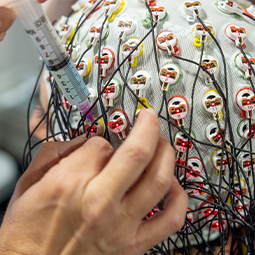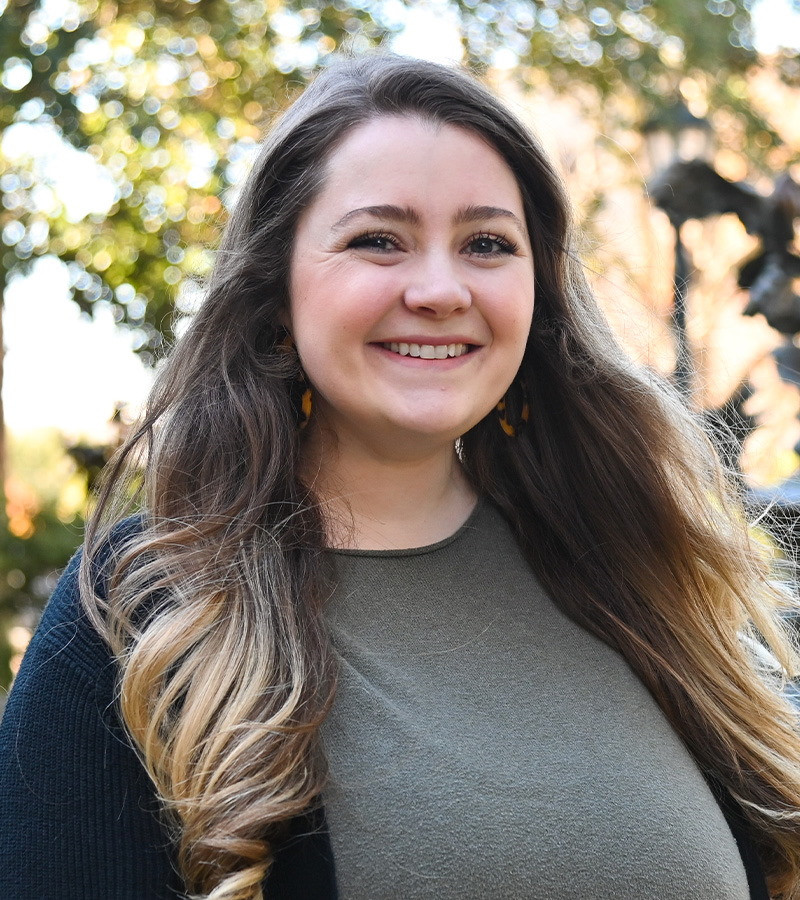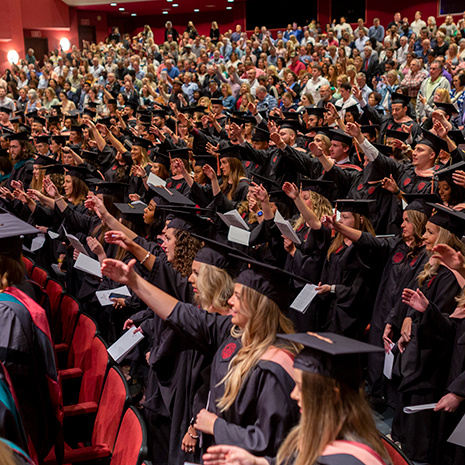
Find Out More
The Ph.D. in Communication Sciences and Disorders degree prepares professionals for academic careers, and therefore its emphasis is on research and the scholarly study of the science of human communication and its disorders.
December 18, 2023 | Erin Bluvas, bluvase@sc.edu
A lot has happened in the past four years for Ellie Cooper. She completed a Ph.D. in Communication Sciences and Disorders (COMD) and landed an assistant professor position at the University of St. Augustine. It’s an impressive set of achievements in a short period of time, but Cooper’s journey began many years ago.
“Hearing loss has played a central role in my life since my earliest memories,” she says. “Ever since I can remember, my grandpa Jim had great difficulty hearing. Years of working in a factory to support his family caused his hearing to decline at a young age, and I vividly remember the effect this had on his life.”
Cooper went on to study communication sciences and disorders at the University of Arkansas and then as a master’s student at Fontbonne University in St. Louis, Missouri. Through her programs and years as a speech-language pathologist at Arkansas Children’s Hospital Northwest, she discovered her passion for working with children who are deaf or hard of hearing and even completed the thousand-plus hours required to earn a certification as a Listening and Spoken Language Specialist, Auditory-Verbal Therapist.
In 2019, Cooper enrolled at USC so she could advance the field through research and teaching. She expected the COMD department to provide a collaborative environment and a vast array of research opportunities, and it did.
“From the beginning of my doctoral program, I’ve been immersed in the area of research focused on finding answers to improving intervention services for children with hearing loss,” she says. “Throughout my academic and professional career, I’ve found mentors to improve my skills.”

The Norman J. Arnold Doctoral Fellow has worked closely with Krystal Werfel, an expert on literacy and language in children who are deaf or hard of hearing, throughout her tenure at USC. COMD assistant professor Lisa Fitton stepped up as Cooper’s primary campus mentor when Werfel accepted a lab director position at Boys Town National Research Hospital.
With research interests focused on the literacy skills of children with hearing loss, Cooper has adopted a holistic approach to her work. In addition to studying the children themselves, she has expanded her research to look at the role of influential adults, including parents and speech-language pathologists.
Supported with funding from the USC Maternal and Child Health Catalyst Program, Cooper investigated the general health literacy and hearing loss health literacy among mothers of children who are deaf or hard of hearing. She published this work in the American Journal of Speech-Language Pathology.
For her dissertation project, Cooper was awarded a SPARC grant from the USC Office of the Vice President of Research to study these areas of knowledge among speech-language pathologists while also accounting for their varying levels of academic training, on-the-job experience, and confidence in these areas. Her findings, which are in preparation for multiple publications, showed that, like mothers, speech-language pathologists may have high general health literacy but low hearing loss health literacy. Further, these professionals believed that they developed more hearing loss health literacy through their work rather than training.
With her dissertation defended, Cooper graduates this month and will begin a new chapter as an assistant professor of speech-language pathology at the University of St. Augustine for Health Sciences. Her accolades include her selection to the Graduate Civic Scholars Program and Early Childhood Leadership Cohort. She was also selected as a Distinguished Early Career Professional by the American Speech and Hearing Association and is the recipient of the Communicative Disorders Scholarship (Sertoma) and Elaine M. Frank Endowed Fellowship (COMD department).
“I plan to continue to research outcomes for children who are deaf or hard of hearing, in addition to their caregivers, and service providers while also having the opportunity to teach and mentor students,” Cooper says of her next steps. “I want to continue to be a leader and a mentor to aspiring professionals.”

The Ph.D. in Communication Sciences and Disorders degree prepares professionals for academic careers, and therefore its emphasis is on research and the scholarly study of the science of human communication and its disorders.

The Arnold School is proud of our 2023 graduates, who will go on to change the world locally and globally. Learn about some of the other outstanding individuals who completed one of our 34 programs this year.